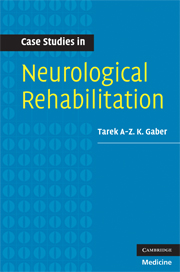1 - The rehabilitation consultation
from Part I - Clinical rehabilitation
Published online by Cambridge University Press: 13 August 2009
Summary
In a rehabilitation setting, the medical/neurological clinic should be more than a standard consultation aiming at diagnosis and medical management of the clinical condition. Beside this core function, the clinic appointment should be a chance for the patient to be assessed in the most comprehensive way. Most neurologically disabled patients will have complex problems such as medical, physical, psychological, mental health, communication, swallowing, sphincteric, tissue viability, equipment, social, financial, and probably more obscure but nonetheless crucial issues. Most members of the rehabilitation team concentrate on the management of the problem relevant to them, with relatively limited ability to appreciate the impact other disabilities are having and the complex way they can interact together to generate a management problem. For example, a patient with multiple sclerosis who presents with falls may also have a bladder problem, with urgency and frequency of micturition, plus a visual impairment and, consequently, may fall while rushing to the toilet.
The rehabilitation clinic should act as the clinical setting to look at the patient with a wide perspective. Rehabilitation physicians should have the ability to evaluate all the relevant pieces of the puzzle and to use their knowledge of the basic practice principles of other therapists/clinicians in order to ‘plug’ the patient into the appropriate services and to review their progress and ensure that goals are achieved.
Rehabilitation physicians should always work in direct contact with the members of their team.
- Type
- Chapter
- Information
- Case Studies in Neurological Rehabilitation , pp. 3 - 5Publisher: Cambridge University PressPrint publication year: 2008



